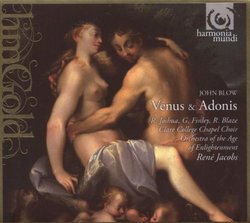| All Artists: Gerald Finley, John [Organ] Blow, René Jacobs, Christopher Josey, Robin Blaze, Orchestra of the Age of Enlightenment, Maria Cristina Kiehr, Rosemary Joshua, John Bowen Title: John Blow: Venus and Adonis Members Wishing: 1 Total Copies: 0 Label: Harmonia Mundi Fr. Release Date: 9/9/2008 Album Type: Enhanced, Import Genre: Classical Styles: Opera & Classical Vocal, Historical Periods, Baroque (c.1600-1750) Number of Discs: 1 SwapaCD Credits: 1 UPC: 794881853625 |
Search - Gerald Finley, John [Organ] Blow, René Jacobs :: John Blow: Venus and Adonis
 | Gerald Finley, John [Organ] Blow, René Jacobs John Blow: Venus and Adonis Genre: Classical |
Larger Image |
CD Details |
CD ReviewsA voice teacher and early music fan George Peabody | Planet Earth | 03/08/2009 (5 out of 5 stars) "A MASQUE FOR THE ENTERTAINMENT OF THE KING!
John Blow (1649-1708), in his official post as organist, was also expected to supply a great quantity of church music, royal odes and secular choral music to celebrate events at court. Consequently, he wrote very little for the professional stage. A notable exception is his opera 'Venus and Adonis', which he called "A Masque for the entertainment of the King". It was first performed before the court at Oxford in 1681. Like Purcell's 'Dido and Aeneas', it is in fact a true opera, totally successful in concept, original in musical content and moving in the characterization of the protagonists. Borrowing the notion of the overture, the prologue and the instrumental dances from the French opera and juxtaposing them with the language of Italian music, Blow created his masterpiece and one of the summits of seventeenth century music. John Blow's 'Venus and Adonis' is a work of intense beauty. Rene Jacobs leading the Orchestra of the Age of Enlightenment and a distnguished roster of soloists brings in a flawless performance. The story is an elaboration of the Greek-Roman tragedy of Venus and Adonis. Blow associates the theme of the Hunt(in which Adonis is killed) and its dangers to that of love and the wounds inflicted by Cupid's arrows. Using episodic gestures, Blow's music, thought to be way to progressive in its day, is indeed imaginative and well suited for the dramatic content. In one instant the music can be sparse,yet effective, dense, yet suitably simple. At the end of Act II the descending chromaticism of the ostinato ground with which the dance of the Graces concludes, darkens the mood after the previous playful arias of Cupid, and is like a premonition of the return of the mortally wounded Adonis and the grief of Venus. Rosemary Joshua (soprano), an irresistible Venus wastes not a word in either colorful representations or vocal suppleness while Gerald Finley's (baritone) reflective longing for her accords with Jacob's elegant direction. Cupid's forthright scene setting sung with increasing assurance (though placed often out of range for the singer) by Robin Blaze also enhanced the drama with his really quite good characterization of a somewhat fickle Cupid. I enjoyed all of the singers, but especially was charmed by the very delightful and many duets, trios and quartets throughout the work. This is, indeed, a highly desirable recording. Rene Jacobs excels in this opera genre, and his commitment to the material is apparent!" |
